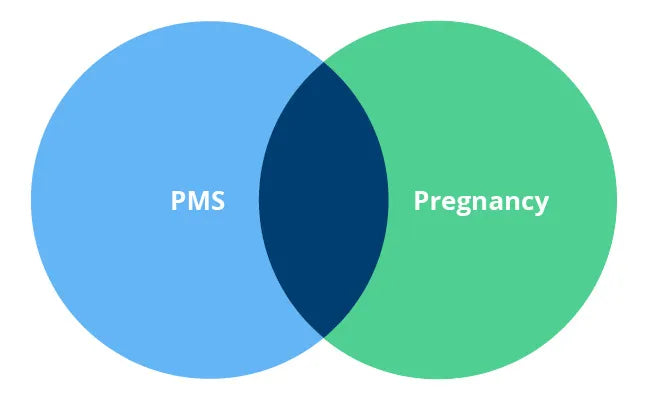PMS Vs Pregnancy Symptoms: Everything You Need To Know
March 28 2023 – Nysh Website

Experiencing severe cramps, nausea, fatigue? Well, these symptoms may make you assume you’re pregnant. But, what most women don’t know is that there are several early signs of pregnancy actually mimic PMS (Premenstrual Syndrome). Knowing whether there’s a ‘pea-in-the-pod’ or not, can be nerve-wracking. But in our guide, we’ve covered everything you need to know about PMS vs pregnancy symptoms.
PMS Vs Pregnancy Symptoms
It can be difficult to actually distinguish the symptoms of PMS and pregnancy because of the many similarities such as:
1. Cramps
It’s normal to experience cramps in the abdominal and pelvic area before you get your periods. The medical term for cramps during PMS is dysmenorrhea. It can last up to the first two days of your periods and gradually decrease as your periods come to an end. In order to get some relief and relax the muscles in your abdominal area, you can use a heating pad.
Experiencing cramps is also common during pregnancy. If you’re pregnant, you’ll experience cramps in their lower stomach or back. This happens because your uterus expands itself causing your muscles to stretch in order to accomodate the fetus. Unlike PMS, cramps during pregnancy can last for weeks.
2. Fatigue
When your periods are due, you can also experience fatigue, even when you’ve barely exerted yourself. This is a symptom that most women experience and it’s mainly caused by the hormonal changes in the body. Once you get your periods, it’ll subside eventually. You can try doing some gentle exercises like yoga to feel less lethargic.
It is also common to feel fatigue during pregnancy because of hormonal changes your body goes through. This feeling of weariness and complete exhaustion is felt most during the first 12 weeks of being pregnant.
3. Light Spotting
During PMS, you could experience some light spotting before your period arrives. The bleeding then gets heavy for the first two or three days of your cycle as it gradually decreases as your period end.
Pregnant women can experience slight bleeding, 6 to 12 days after conceiving. This happens when the fertilized egg is implanted in the uterine lining. The bleeding experience in an early pregnancy could happen when you’re nowhere close to your period cycle.
4. Food Cravings
Food cravings happen during PMS, mainly because of decreased serotonin levels (chemicals produced in the central nervous system). Along with transmitting information between the nerve cells, they’re also responsible for regulating your mood. Since your body requires carbohydrates to produce serotonin, you crave for foods that are high in carbs and fats.
One of the reasons why women have food cravings after conception is due to pregnancy hormones. These cravings usually start during the first trimester itself. A lot of nutritional deficiencies like lack of Vitamin C, calcium, or low sodium in the body can be responsible for it. That’s why pregnant women crave specific foods like pickles, yogurt, and lemons in order to meet these nutritional deficiencies.
5. Nausea
During PMS, women do not experience nausea, but in rare conditions, some may feel it, mostly due to digestive issues.
Pregnant women feel nauseous during the first trimester. It’s commonly referred to as ‘morning sickness’ but can happen any time of the day. This happens because of several reasons like increase in the pregnancy hormones, smelling strong odors, or eating any specific kind of food.
6. Breast Changes
Before your periods your breasts can appear to be fuller and tender because the body’s progesterone (hormones produced in the ovaries) levels are increased. This reduces towards the end of your periods.
Pregnant women also have changes in their breasts wherein they feel fuller and heavier than before. These changes take place around 10-12 weeks after a woman conceives.
How To Know That You’re Pregnant?
Since there are so many similar symptoms between PMS and pregnancy, many women often get confused. But you must keep in mind two things -
- PMS Symptoms Go Away
One major difference is that most PMS symptoms of cramps, fatigue, breast changes, nausea, and food cravings come to an end 3 to 4 days your period ends. But pregnancy symptoms stay for longer than a couple weeks.
- You Don’t Get Your Period
The other most common signs of pregnancy is a missed period. When your period doesn’t arrive, it is possible that you’re pregnant. But don’t forget that there can be other reasons for a missed period like stress, the effect of medications you've been taking, or PCOS (Polycystic Ovary Syndrome). Hence the only way you can confirm this is by taking a pregnancy test.
It will put your worries to rest as the sooner you know the better care you can take. Also, if you feel that you’re experiencing any unfamiliar symptoms in your body, you must confide in your doctor.
Summing Up
PMS symptoms can match with most of the early symptoms of pregnancy. But stressing yourself thinking about your symptoms won’t do any good. It’s important that you take a pregnancy test as soon as possible for a more accurate result. In case the test is negative and you still feel out of sorts, do make an appointment with your doctor.
FAQs
When Do You Start To Feel Pregnant?
You can start to feel pregnant and notice the initial signs of pregnancy 1-2 weeks after conceiving. There are times when women don’t realize their pregnancy symptoms until they miss their periods or even after entering a few months of pregnancy.
What Should You Not Do Before a Pregnancy Test?
It’s advisable to not drink too much water or any other liquid before taking a pregnancy test. That’s because the accuracy of your test results can get affected if you consume excess fluids.
What Does Pregnancy Fatigue Feel Like?
Pregnancy fatigue can make you feel tired, nauseous, and even emotional at times.
What Kind Of Breast Pain Indicates Pregnancy?
When breasts become extra sensitive to any kind of touch, get tender, swollen, and sore, it can be an indicator of pregnancy.


0 comments